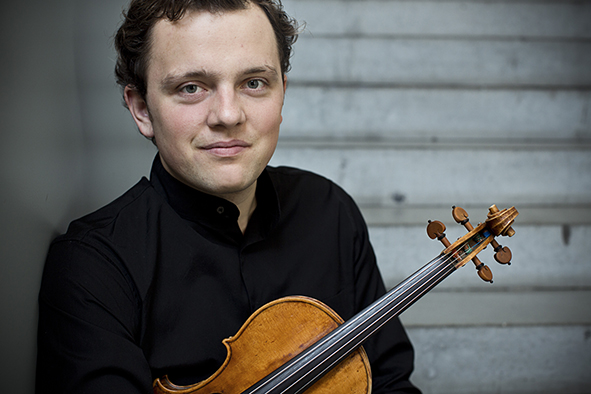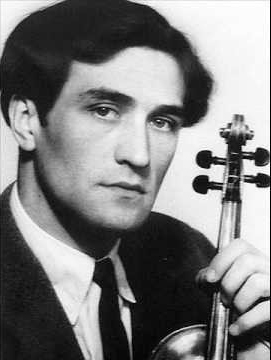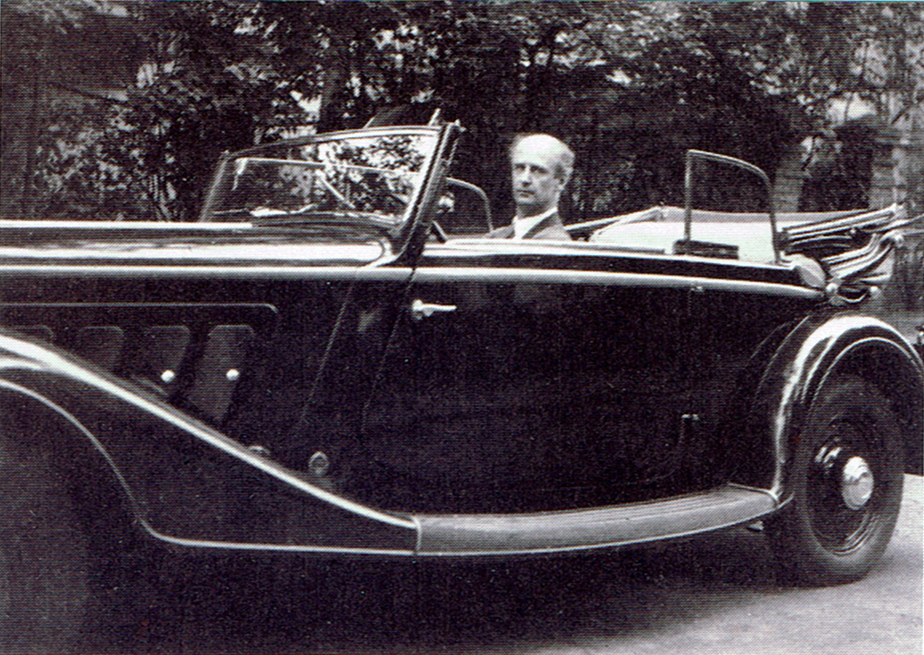Month: June 2019
News
Interview with Philipp Bohnen, first violin of the Varian Fry Quartet. The Varian Fry Quartet has been invited by the SWF to play in Paris on 19 October next for the association’s fiftieth anniversary.

1- Philipp Bohnen, you are a violinist with the Berlin Philharmonic as are the other members of the Quartet. One question immediately comes to mind: does the name Furtwängler still mean something for a Berliner of today?
Yes, of course it does. Wilhelm Furtwängler is until today as present in the memory of the orchestra as Herbert von Karajan, also to the younger generation of us musicians.
Just in the beginning of June we played with Daniel Barenboim who talked a lot about Furtwängler. How he had played for him, how Furtwängler invited him to come and see his rehearsals and learn from him. Furtwängler made a deep impression on Maestro Barenboim and he is a very regular guest and the first honorary conductor of our orchestra. And in Mr Barenboim mind and ears he still hears the interpretations of Wilhelm Furtwängler, as he said. And so through Maestro Barenboim who of course brings also so much of his own ideas, Wilhelm Furtwängler’s music can in a way still be heard today.
2- Is it easy to reconcile your duties with such an orchestra and your work within the Quartet?
For us musicians of the Berlin Philharmonic it is of course the most important thing to play in the orchestra and to do so at the highest possible level. But a lot of our colleagues do chamber music in all different kinds of groups. We as a quartet feel that both Ensembles help each other.
As a quartet we benefit a great deal from our work within the orchestra. We are very inspired by the colors our colleagues play for example their wind solos with and also the power of such a string sections as we have it in the orchestra, is something not every quartet has as a musical background. So the inspiration of that is amazing.
But we also feel, that playing in the quartet helps us in the orchestra. When we study our quartet repertoire, we usually have a lot more time to work on little details. We take our time to really become one instrument and those musical experiences are very precious and fulfilling.
3- Unless I am mistaken this is the first time you will have performed in France. Does this have particular significance for you?
Yes, that is true, we will perform for the first time in France and we are really looking forward to it. We know from our concerts with the Berliner Philharmonic how fantastic it can be to play for the audience in France. I always feel that people listen with very open ears and therefore are open to new ideas. At the same time you always feel the very warm atmosphere in the halls.
And to perform in Paris, one of Europe’s and the world’s cultural capitals, is really a dream come true. Also because of our name patron Varian Fry.
4- More generally, what repertoire are you working on? Does the music of today feature among your concerns?
The repertoire of our quartet world is so rich and amazing, that we do not want to either focus on something particular nor rule something completely out. We try to create concert programs that make sense together. Usually, we like to combine repertoire of different times. The music of contemporary composers can be very good, challenging and exciting. We haven’t had too many contemporary composers in our concert repertoires yet but there is definitely more to come in the future.
5- I am not sure the name Varian Fry is well known in Germany, but neither is it in France. Would you tell us something about it?
Varian Fry was an American journalist who helped over 2,000 people to flee from the Nazi regime during the Second World War. He was based in Marseille and organized a whole network of helpers. He saved artists, writers and composers such as Hannah Arendt, Lion Feuchtwanger, Klaus Mann, Franz Werfel, Marc Chagall and Bohuslav Martinu. And of course many many more.
The city of Berlin named a street after him and that is how we first found out about him because that street is located very close to the Philharmonie. For us, our name is very important because of two reasons: We honor a man who was so brave to put his own life at risk to save others, and the ‘Varian Fry Strasse’ is very close to the Berliner Philharmonie, our musical home.
We would feel most honored if us taking Varian Frys name helped a little bit, not to forget him and maybe for some people to get to know him and to be inspired by his bravery.
(Compiled by Stéphane Topakian)
(Sibelius + Beethoven) – (Schubert + Ravel + Wagner) = Pfitzner
We had already pointed out the programme changes that litter in joyous disorder the concert lists of Furtwängler. Here is one that made almost complete nonsense of a poster.
For his concert of March 1944 at the head of the Vienna Philharmonic, the pre-programme at the start of the season announced: Sibelius, Suite Karelia – Pfitzner, Symphony op. 46 – Beethoven, Symphony No 7.
The subscribers — happy or frustrated? — were in fact regaled with: Schubert, Symphony No 8 – Pfitzner, Symphony op. 46 – Ravel, Daphnis & Chloé (suite No 2) – Wagner, Overture to Tannhäuser.
At least Pfitzner’s fans could say ‘phew’!

Some of our members have finely tuned ears! They have discovered that Gluck’s Overture to Alceste, listed in the contents of the boxset Berlin/Archives 1939-1945 published by the Berliner, greatly resembles —but really greatly— the same overture recorded in studio by Telefunken (29 October 1942) following the concerts (25 to 28 October). The label presented it, however, as in fact coming from the concert itself, along with Schumann’s Cello Concerto and Bruckner’s Fifth.
Many elements support their assertion:
– the acoustics are not the same: Singakademie for the disc, Philharmonie for the concert,
– the medium is typical of the 78rpm record: a slight but persistent crackle and no use of a tape,
– the public is oddly silent,
– the timings are absolutely identical and a few small noises occur in the same places…
It is evident that the producer introduced a foreign element into the programme: a commercial disc alongside live performances, in order to ‘fill the gap’, the tape of Alceste not having survived!

In itself this is not so dramatic; yet it would have been correct to mention it and explain it.
As always the SWF is careful to ensure the precision of its data. With our thanks to Roger Smithson, Philippe Jacquard and a few others for the pertinence of their observations.
In the portrait gallery of artists who performed with Furtwängler, here, from the winter of 1941, is a newcomer: the violin prodigy Gerhard Taschner, not yet twenty, appointed Konzertmeister of the Berlin Philharmonic alongside Erich Röhn.
For his first appearance, Furtwängler allotted him a star solo spot between pieces by Reger and Dvorak. This marked the start of his recognition in the violin world, both at the time and in the years to come.

We present a facsimile of this programme of 30 November 1941, also accessible via the concert.
Clearly the Berlin Philharmonic boxset has provoked comment. The written press is echoed by the radio.
Let us in particular note a special programme devoted to it by the station Deutschlandfunk Kultur on Sunday 9 June at 3.30 pm. The guest is none other than Helge Grünewald, the president of our sister beyond the Rhine, the Furtwängler Gesellschaft.

One day someone will write an article on Furtwängler and the motor car. He came to it relatively late, in the early 1930s, after taking driving lessons notably from Gilbert Back, a violinist with the Berliner.

However that may be, his first car was worthy of his celebrity: a Horch convertible — a brand even more select than Mercedes — the 830 model, equipped with a 3 litre V8 engine and styled by Gläser of Dresden, like the one below.

He did not keep it long. Taking Richard Strauss back after a rehearsal (Elektra?), and deep in a discussion, he forgot about the traffic, mixed up the pedals and ended his trip in a luxury car in a parking space that turned out to belong to… the Crown Prince! Strauss never again set foot in a vehicle driven by Furtwängler, who subsequently downgraded his pretensions, driving a DKW and even a Volkswagen ‘Beetle’!
With thanks to Klaus Kramer of the Horch Club, Zwickau
